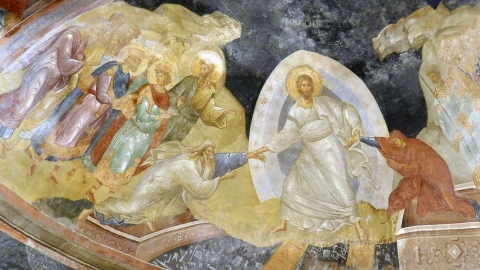China: Beijing Imposes “National Security” Law on Hong Kong

Police anti-émeute à Hong Kong
“China continues to be a very heavy yoke. The Communist Party wants to control everything, not only the structures but also the minds and hearts of the citizens. Today, the methods have changed little, "said Msgr. Joseph Zen Ze-kiun, then Bishop of Hong Kong, to the Italian daily L'Avvenire of the Italian Episcopal Conference in January 2006.
China Continues To be a Very Heavy Yoke
On May 28, 2020, the Chinese parliament in annual session in Beijing almost unanimously adopted a “national security” law for Hong Kong. The text is made up of seven articles, the daily La Croix said on the same day, including one that prohibits all interference by foreign forces in Hong Kong, another authorizes the Chinese justice and police systems to establish themselves in Hong Kong. Finally, Beijing can “prevent, stop and repress any action which seriously threatens national security, such as separatism, subversion, the preparation or execution of terrorist activities, as well as the activities of foreign forces which constitute interference in the affairs” of Hong Kong, according to the bill that had been submitted to the National People’s Congress.
Anti-government protests have been shaking Hong Kong for a year, originally protesting the bill to facilitate extraditions to mainland China. Until now, the peninsula has enjoyed a greater autonomy than the continent, in accordance with the joint Sino-British declaration of 1984. Thus the practice of worship is free there, unlike mainland China. The announcement of the “national security” bill sparked new protests on the island on Sunday, May 24.
On the same day, Pope Francis simply assured “the faithful Catholics of China” of the presence at their side of the Catholic Church, “which wants to be close to the hopes but also to the trials faced by the Chinese Catholics.” In 2008, Pope Benedict XVI made May 24, the feast of Our Lady Mary Help of Christians, a day of prayer for the Church of China. The Virgin Mary, patron saint of China, is particularly venerated in the Sheshan Marian sanctuary in Shanghai.
The Vatican Did Not Say a Word
On the anniversary of the terrible events of June 4, 1989 in Tiananmen Square, the Italian site Nuova Bussola Quotidiana questioned Cardinal Joseph Zen, Bishop Emeritus of Hong Kong. “The anniversary of the massacre in Tiananmen Square seems to have taken a particular turn this year. What do you think?” “It’s true, with everything that’s happened this year, we are getting increasingly closer to the possibility of another Tiananmen. This is because the government has used every means at their disposal to crush all our legitimate protests, the police have practically behaved like beasts. I am amazed that our brave young people who want to defend Hong Kong’s autonomy and freedom are arrested, beaten, tortured. Now with the threat of this national security law, we are truly concerned,” said Cardinal Zen.
To a question about the appointment of the new bishop of Hong Kong, who has been under apostolic administration for a year and a half, Cardinal Zen mentioned “the situation of uncertainty in Rome,” after the Provisional Accord of September 22, 2018 (still kept secret) between the Vatican and Beijing, on the appointment of bishops. Msgr. Joseph Ha, who acts according to the teachings of the Church’s social doctrine, said Cardinal Zen, has unfortunately been declared “to have critical views against the Chinese government, and not to enjoy Beijing's blessing.” Cardinal Zen exclaims, “This is not correct, because political criteria cannot be placed above religious ones! We must have a leader to guide us at this moment, not one who willingly gives in to pressure from the Communist Party… the Vatican has tried to please the government of Beijing and has never said a word about the evil things that have been committed. Now the whole world can see how police brutality is torturing our young people, beating them, arresting them, and the Vatican has not said a word to defend them. This worries us.”
Religion No Longer Belongs to Us
In China, shops, restaurants, cinemas, and industrial production were deconfined in early March; the churches remained closed until June. After five months of closure due to the pandemic, the Chinese government has announced the reopening of the churches, as published by the Churches of Asia (EDA) agency on June 9, 2020. But the bureaucratic processes and the conditions of reopening make the resumption of worship particularly difficult for the faithful. Fr. Paul, who lives in the center of the country, deplores: “to reopen the church, we must obtain a permit from the authorities at all levels: village, town, and province.” In addition, there are temperature controls, the wearing of masks, the provision of disinfectant gel and compliance with social distancing. In certain provinces, the Government Patriotic Association requires, for the reopening, homilies on love of country with patriotic hymns, as part of the “sinisation” of religions as wanted by Beijing. “We have the impression that religion no longer belongs to us, and that it belongs to the Party. But must our bishops, who enjoy the favors and advantages granted to them by the Party, always remain silent? And does the Vatican, who signed the Provisional Agreement two years ago, realize the extent of the problem?” asks this priest, with anguish.
(Sources : cath.ch/imedia/la croix/nuova bussola quotidiana/eda – FSSPX.Actualités - 27/06/2020)





